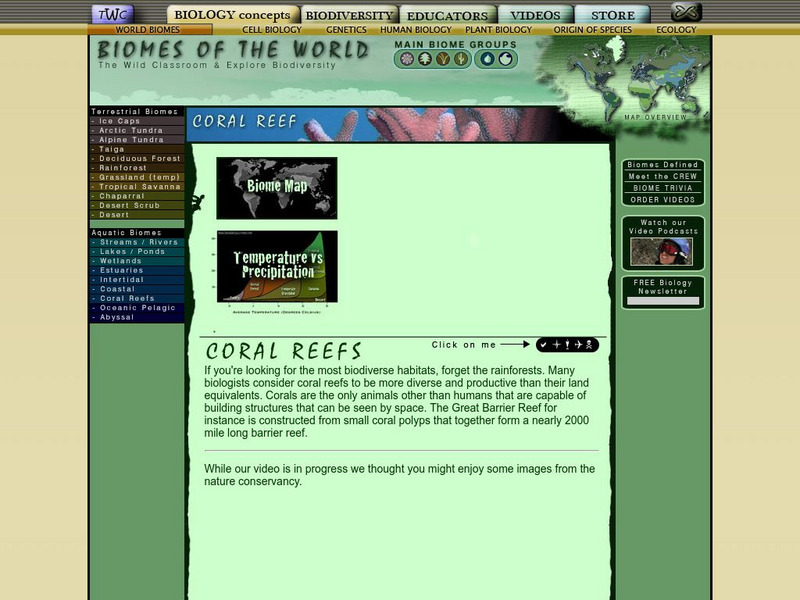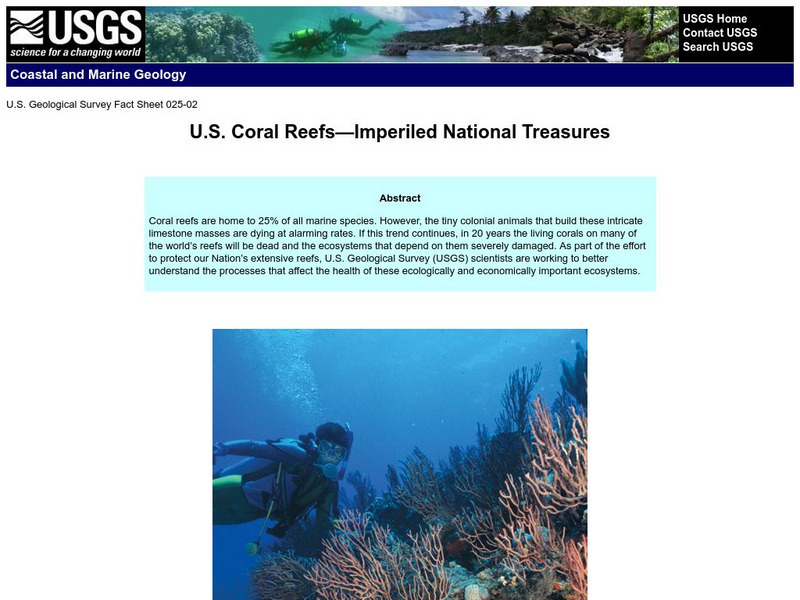Smithsonian Institution
National Museum of Natural History: Ocean Portal, You Navigate
Delight in the fresh colors, sights, and sounds on this dynamic site on the ocean. Major categories consist of Ocean Life & Ecosystems, The Ocean Over Time, Ocean Science, and The Ocean and You. New information on sharks, a slideshow...
American Museum of Natural History
American Museum of Natural History: O Logy: Stuff to Do: Create a Coral Reef
Detailed instructions, with photographs for every step, for how to build a coral reef diorama.
King's Centre for Visualization in Science
Explaining Climate Change: Lesson 5: The Impacts of Climate Change
This is the fifth lesson in a series of learning modules on the topic of climate change. Using scientific models, it takes a look at the effects of climate change on different parts of the earth. Five key ideas are explored: polar...
NOAA
Noaa: Ocean Service Education: Corals
This Coral Tutorial is an excellent resource with diagrams, pictures, animations and short videos. All aspects of coral biology are discussed. As an added benefit, pdf versions of the site are available along with a subject review...
PBS
Pbs Learning Media: Coral Reef Connections
Dive in and explore what makes this beautiful world so fragile. In this Web feature, from the PBS series "Evolution," discover how coevolution has shaped the ecological relationships among reef creatures.
Center for Educational Technologies
Nasa Classroom of the Future: Coral Reefs: Dissappearing Resource
Why are the reefs disappearing? Use this site to explore the science behind the issue. Useful at several grade levels.
The Wild Classroom
The Wild Classroom: Biomes of the World: Coral Reef Biome
Learn about the coral reef ecosystem. Find out about plants, animals, adaptations, and conservation efforts.
NOAA
Noaa: International Year of the Ocean: Pacific Coral Reef
"This [online] coral book was created to provide the reader with an introduction to the Pacific's fascinating coral reef ecosystem." The resource is for young students learning about life under the sea. Translated in English, Hawaiian...
NOAA
Noaa: Now That's Complex [Pdf]
Define a habitat. Discover how a relatively small area can be divided into many habitats for smaller organisms.
Canadian Museum of Nature
Canadian Museum of Nature: Invertebrates
Features interesting facts and colorful photos of a variety of invertebrates with a map of the location where they can be found.
Next.cc
Next: Coral Reefs
Learn about the plants, animals and sea life that inhabit coral reefs by completing the five activities. Explore reefs further by clicking on one of the numerous links provided.
Missouri Botanical Garden
Missouri Botanical Garden: Tropical Oceans: Coral Reefs
An interesting site about coral reefs. It explores where the reefs are found, what the reefs are, animals that live in the reefs, and preservation of the reefs.
National Center for Ecological Analysis and Synthesis, University of California Santa Barbara
Kids Do Ecology: Biomes
At this site from National Center for Ecological Analysis and Synthesis you will find the answers to many questions about biomes. You will also find a listing of biomes along with a detailed explanation of each.
TED Talks
Ted: Ted Ed: The Beautiful Math of Coral
A science writer re-creates the creatures of the coral reefs using a technique invented by a mathematician- simultaneously celebrating the amazements of the reef and deep-diving into the hyperbolic underpinnings of coral creation. [15:32]
Climate Literacy
Clean: Coral Bleaching: A White Hot Problem
Students investigate coral bleaching using water temperature data from the NOAA National Data Buoy Center. Then they learn about the habitat of corals, the stresses on coral populations, and the impact of increased sea surface...
Geographic
Photius: Bahrain Geography and Population
Read about Bahrain's topography. Made up of several islands, you can find out how the country is connected by causeways from one island to the next.
Climate Literacy
Clean: Understanding Ocean Acidification
The following is a series of 5 activities regarding ocean acidifcation Students will learn about rising Carbon Dioxide in the atmosphere, climate change, ocean reefs, marine calcifers and ocean pH.
Climate Literacy
Clean: A Global Issue: The Impacts of Climate Change
This is lesson five of a 9-lesson module. Activity explores the effects of climate change on different parts of the Earth system and on human well-being: polar regions, coral reefs, disease vectors, extreme weather, and biodiversity.
Other
Reef Base
This is a database on coral reefs where you can access coral reef data, take quizzes on corals, view images, get maps of reefs and more.
US Geological Survey
Usgs: Imperiled National Treasures: u.s. Coral Reefs
Efforts to protect and conserve coral reefs located in territories of the United States fall into the hands of the USGS. Scientists are working diligently to understand the marine ecosystems so as to determine the exact reasons many are...
US Navy
Office of Naval Research: Coral Reefs
Characteristics, location/reef life, humans, and the environment are the topics explored in this competent site. A quick quiz can be found at the end of the text.
Other
The Coral Reef Alliance: Threats to Coral Reefs
Water pollution, sedimentation, coastal development, destructive fishing practices, are but a few of the threats to coral reefs addressed on this thorough site.
Smithsonian Institution
Smithsonian National Zoo: Zoogoer Magazine: Beneath the Surface and in Deep Water
Robert Rattner's article, "Coral Reefs: Beneath the Surface and In Deep Water" focuses on the wide variety and types of life found on the coral reefs. Several of the types of life discusses include dusky damselfish, fanworm, basslets,...
Monterey Bay Aquarium
Monterey Bay Aquarium: Brain Coral
Resource presents extensive information about brain coral, including diet, size, range, relatives, conservation, and cool facts.




















